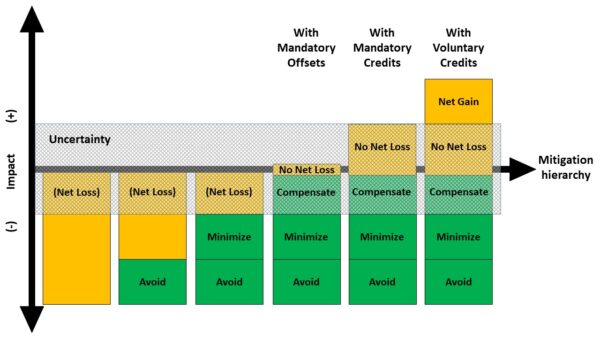Net Positive Initiative
BRI’s Net Positive Initiative (NPI) is a new research program designed to identify and promote advances in global biodiversity gain. From marine ecosystems to arid desert environments, we aim to offset global biodiversity loss, combat climate change, and practice environmental justice. Contributing programs focus on reducing environmental contaminants, achieving carbon neutrality, and facilitating the responsible development of renewable energy.
What is Net Positive?
Climate change, overexploitation, habitat loss, disease, and predation are some existing and emerging threats to global biodiversity. Current regulatory policy in the United States and elsewhere aims to mitigate such threats and target “no-net-loss” of protected species. However, aiming for no-net-loss risks underachievement, especially in the face of high uncertainty surrounding the cumulative impacts of various threats. Instead, net positive approaches offer proactive, precautionary solutions that target net biodiversity gain. For example, following the mitigation hierarchy, adaptive management may (1) avoid, (2) minimize (3) compensate for, and (4) further offset threats. To attain net biodiversity gain, offsets must outweigh any costs, go above and beyond no-net-loss, and achieve net benefits. BRI’s Net Positive Initiative focuses on establishing conservation programs that support net biodiversity gain. We offer our renowned skills and expertise to assist both our public and private sector clients in meeting net positive goals.

About the Director, Holly Goyert, Ph.D.
Holly has dedicated the past two decades of her career to quantifying interactions along marine communities of birds, mammals, fish, and invertebrates, from the seafloor to above the sea surface. With two decades of experience working in both the public and private sectors, she leads the Atlantic Marine Bird Cooperative (AMBC) working group for Marine Spatial Planning. Through the AMBC, Dr. Goyert coordinated the development of a net positive initiative for wildlife affected by offshore wind energy development. She now applies that experience to collaborative efforts with other environmental programs at BRI. Holly speaks fluent Spanish and has both lived and worked in various locales throughout North and South America.
Focal Activities
- Contaminants: BRI has decades of experience identifying mercury in ecosystems and conducting community outreach to reduce the impact of environmental toxins.
- Carbon: BRI is actively involved in the growing carbon market to restore ecosystems, conserve wildlife, and enhance human socio-economic development through carbon-financed land use change.
- Renewable Energy Development: BRI is a leader in assessing positive and negative impacts to wildlife from wind and solar energy development.
Skills
- Biodiversity surveys
- Decision support
- Statistical modeling and quantitative analyses
- Compliance
- Communications
Photo Credits: Header photo © iSotck, fokkebok


